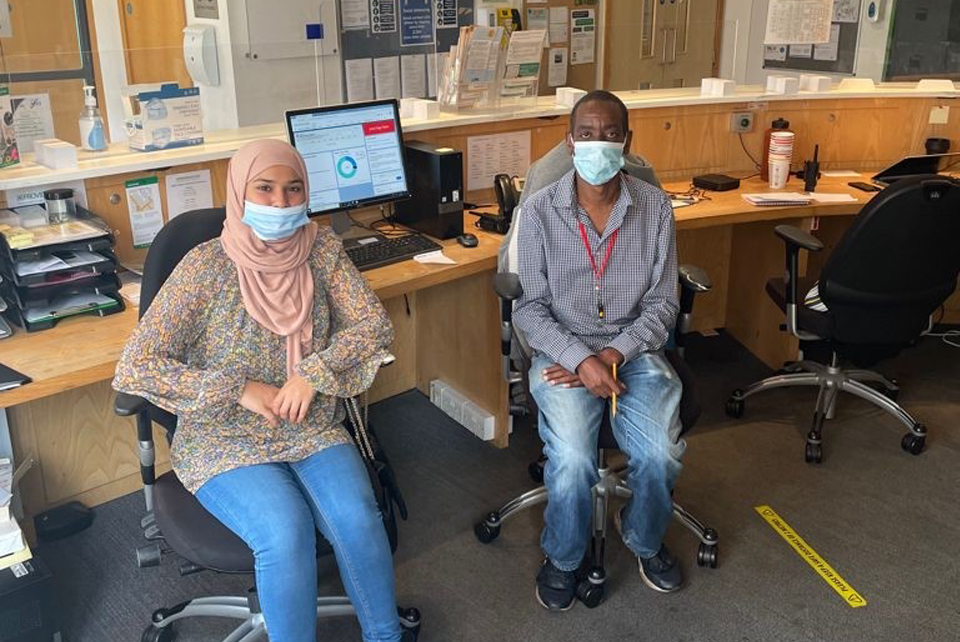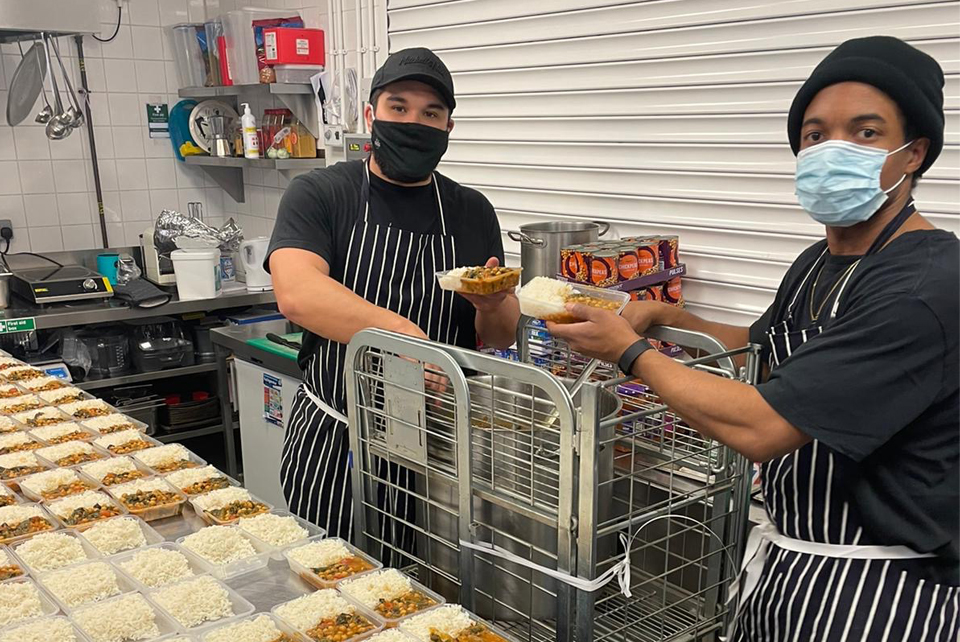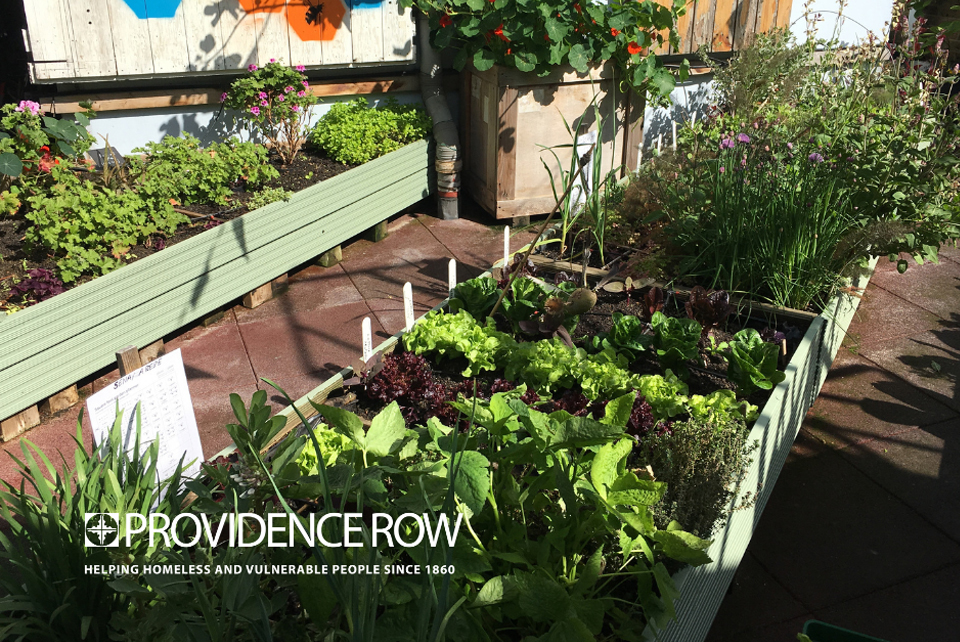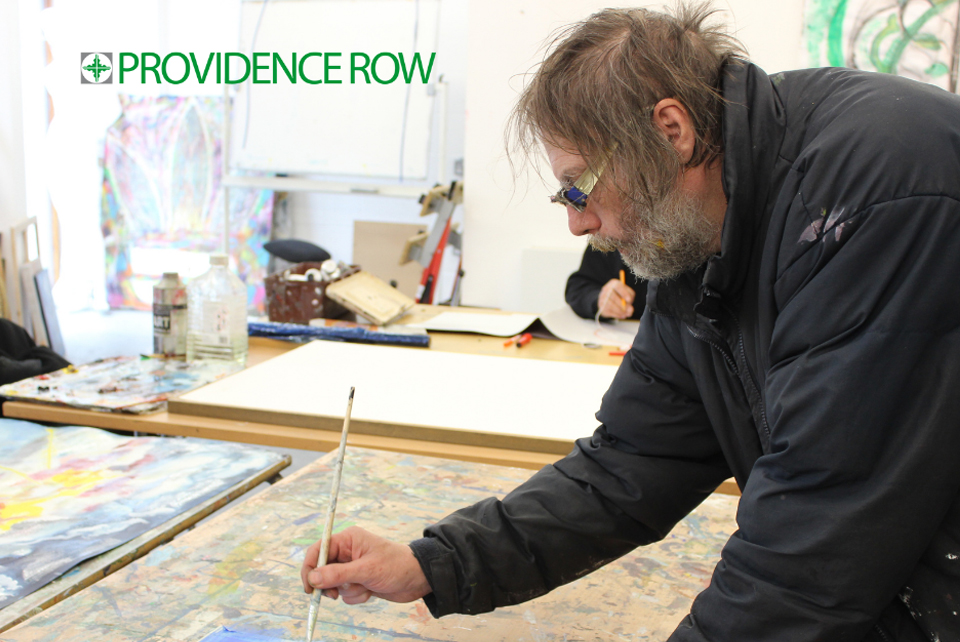Over the past few years at Christmas, our team have gifted brownies to our clients from social enterprise Rise Bakery. Rise Bakery is one of the initiatives set up and run by Providence Row, a charity supporting people affected by homelessness in East London, where rough sleepers and formerly homeless trainees are able to gain valuable skills, experience and qualifications under the supervision of trained chefs producing high quality brownies. The bakery is an extension of the charity’s award-winning Catering Trainee Scheme, which has been helping people back into work for over five years.
When COVID hit, Providence Row made the tough decision to suspend operations at Rise Bakery, alongside their other trainee schemes. The team adapted their services to focus on the immediate needs of people sleeping rough, whilst maintaining support for clients vulnerable to homelessness. I recently talked to Emma Kreeger, Head of Corporate and Community Fundraising, to find out more about their current services, how operations have changed over the course of the pandemic, their plans for the year ahead and how we can support the charity:
Can you tell me a bit more about the origins of Providence Row?
Providence Row was founded in 1860, by Fr Daniel Gilbert of St. Mary Moorfield’s Catholic Church (located just behind Liverpool Street station). Moved by the poverty he saw around him, he enlisted the help of an order of nuns; The Sisters of Mercy, and together they raised funds and found premises in East London which opened on to a narrow lane called Providence Row – and that was the start of our charity!
Over the years our services have significantly changed in line with the external environment and the needs of the homeless population. This has been particularly true in the past year, when we had to significantly change the way we work and the support we provide due to the COVID-19 pandemic. In spite of all the changes, an enduring feature of our work is that we look at the ‘whole person’, and choose to see what they can, rather than cannot do. We choose to see their strength, talents and humanity.
Your work is focused around East London. Why this area of London in particular?
Sadly, London has the highest number of people sleeping on the streets in the UK, and for the more localised picture; Tower Hamlets (where Providence Row is based) has appeared in the top 10 London boroughs with the highest number of people sleeping rough for over a decade. Over a third of households in Tower Hamlets live in social housing and it is estimated 4 in 10 households live below the poverty line (the highest poverty rate across all local authorities in England and Wales).
Providence Row is commissioned by Tower Hamlets local authority to run crisis response services for people who are rough sleeping in the borough and to support them on a pathway to recovery.
East London is one of the most deprived areas of the UK. Whilst our services supporting people rough sleeping are largely focused on Tower Hamlets we also work with people facing homelessness in the City of London, Newham, Hackney and Walthamstow.
Can you give me some more detail about the type of services you provide?
We help people who are rough sleeping or vulnerably housed to overcome the challenges they face, helping them get off, and stay off, the streets of London and begin their journey towards recovery and a stable, secure life. We help people who are socially and financially excluded from society to re-develop confidence in themselves, trust in others, and support them to get their lives back on track. We do this through an integrated provision of crisis support, advice, recovery, learning and training programmes.
Our services include:
A Welcome Area and Resource Centre – the first point of call for someone who is sleeping rough to have a conversation with a support worker, access to showers, toilets, warm clothes and hot food.
An Advice and Support Team that will assist with housing, benefit access and GP appointments.
Reset Outreach and Referral Service supports with drug and alcohol usage and has an onsite needle exchange.
An Outreach Psychotherapy Service that offers support for people who have suffered severe trauma or mental health challenges as a result of homelessness.
A Homelessness Prevention Service (Routes to Roots) which supports people to find safe accommodation and a pathway to support after a stay in hospital.
And lastly, Employment and Learning Programmes and a Peer Mentoring Training Scheme (for people with lived experiences of homelessness, addiction or poor mental health).

Pre-Covid, how many people were using your services in a typical year?
In the year prior to the pandemic approximately 1200 people were supported through our services.
How has the pandemic affected your work and how you operate?
Over the last two years we have significantly adapted the way that we deliver our services, and how we operate as a charity. Like many other organisations, our back office staff (finance, fundraising, HR etc) immediately moved to home working, but our frontline staff (all those working directly with clients) had to quickly adapt to new ways of delivering services and manage the new challenges that the pandemic presented.
For much of 2020 we supported to run 3 hotels as part of the Governments ‘Everyone In’ scheme and our support teams worked hard to ensure that we could find accommodation for rough sleepers as quickly as possible.
In order to keep our clients safe we have had to limit the footfall of clients at our day centre, so adapted an appointment based system and increased our outreach services deliver support in hotels, hostels and on the streets. Where possible we were also able to deliver some services over the phone and on Zoom.
Unfortunately, we have had to suspend some activity such as our learning and training programmes – including Rise Bakery our social enterprise. Due to the vulnerability of our client group, it has been too risky for us to restart any group activity – but we hope that this year will enable us to.
During the pandemic, we introduced a new health hub which supports GP registrations and the chance to speak to NHS professionals about health concerns.
Have you seen an increase in demand for your services over the past 2 years and how have you responded to this?
Unfortunately, we have seen an increase in demand across all our support services over the past two years. In addition to seeing an increase in new people sleeping rough for the first time – we have also seen an increase in drug and alcohol misuse, and poor mental health due to the impact of lockdowns and clients feeling isolated. Our response to this has been to increase capacity within our existing support services.
We have expanded our RESET service with 4 extra Navigator posts; supporting people placed during the pandemic with a substance misuse need to work through a pathway of treatment and recovery, once our outreach team have referred them into the service.
We increased the number of psychotherapists in our mental health team; including a specialist Female Outreach worker to specifically work with women who have suffered trauma.
We adapted and rapidly expanded our Food Programme to support people living in temporary accommodation – many of whom were placed during the pandemic in hostels, but do not have access to food or cooking facilities – at the height of the pandemic we were delivering 3500 hot meals a month!
We also expanded our Routes to Roots hospital service into Hackney, which helped to clear beds which were desperately in need at the height of the pandemic, moving people facing homelessness on discharge from hospital into safe accommodation and continued support to prevent future homelessness.

Last year, the Government launched the ‘Everybody In’ campaign, where numerous charities, Governmental bodies and other support organisations came together in a bid to end homelessness. Have you seen the impact of this campaign in your work and, with the changes in The Cabinet, do you think there is still the drive behind the scheme to make real change?
The scheme definitely presented positive results for our clients. Not only did it provide them with a safe place to sleep temporarily whilst longer term accommodation was sought, but it also presented a unique opportunity for us to deliver a package of support to combat the root causes of homelessness all under one roof, and without the reliance on the client to attend appointments. We delivered services directly to the hotels; such as addiction support, mental health support, GP’s & nurses, and keyworker appointments. During this time period we were able to support over 100 people to move on and maintain stable accommodation.
The scheme showed us how many people we could support and with the injection of funds we saw real positive change. What we would now like to see, is a clear strategy from Government setting out how the scheme translates into real, lasting change for people experiencing homelessness in the UK supported by long term funding and investment. Let’s just say we are waiting and hoping at the moment!
There has been an increased awareness of the hidden homeless recently. Could you elaborate on this issue and how Providence Row is helping in this area?
Many people who become homeless do not show up in official figures. This is known as hidden homelessness. This includes people who become homeless but find a temporary solution by staying with family members or friends, living in squats or other insecure accommodation.
Quite a large proportion of the people we work with are classified as hidden homeless. A lot of the work we do is in homelessness prevention – tackling the root causes of homelessness to help break the cycle, and support individuals to get back on their feet, back into employment, in stable accommodation and feel like they are part of the community again.
We receive a lot of self-referrals; people enquiring about how we can help them via our website or giving us a call, or even presenting at our day centre to come and chat to us about their situation. We also work with the police, Tower Hamlets local authority and a number of other organisations that will refer people living in vulnerable housing situations to us.
The Winter months are a critical time of year for those who are living on the streets and for those who are vulnerable to homelessness. Do you run specific support initiatives at this time of year?
Providence Row supports to run a pan-London programme called SWEP (Severe Weather Emergency Protocol)– opening or managing spaces that can be used as shelter for people sleeping rough when there is an increased risk of death due to the cold weather (e.g. when temperatures fall near to or below freezing). Pre-pandemic we would run a shelter on site at a day centre, however as it is still not safe for us to have groups of people on site at the moment, we have been coordinating SWEP in local hotels for the past two years.
The roof garden at Providence Row has recently won 3 London in Bloom Awards. Congratulations! Could you tell me some more about garden and what it is used for?
Thank you! We are incredibly proud of our unique garden, run by our fantastic gardener Julie. Our roof garden has three main functions:
- Growing food sustainably to supply our kitchen with fresh produce which is used to cook healthy meals for vulnerable homeless people. The garden grows up to 100 types of produce at any one time and produces food all year round, just to give an idea of context from October 2020 to May 2021, 79kg of produce was made into 985 meals and distributed through our COVID food programme.
- Offering people affected by homelessness an opportunity to gain an Open College Network (OCN) Entry Level 3 Sowing and Growing Horticulture accreditation, providing a pathway to employment opportunities.
- Benefiting the health and wellbeing of people affected by homelessness, offering much-needed respite from the busy, polluted London streets.

What plans do have in place for the organisation for 2022 and what are your hopes for the year ahead?
We are hoping for a stable year that allows us to provide greater accessibility to the people we support. We are hoping to be able to keep the Day Centre open for drop-in care when people need it most, rather than appointment based. We also hope to restart and uplift some of the services that had to be put on hold as we focused on crisis support, including our employment and training schemes. During the pandemic, we introduced a new health hub, which offers Covid & Flu vaccines as well as support to register with a GP, a chance to speak to NHS professionals about health concerns, the Covid vaccine, HIV and STI screening and Hep C testing. This along with our psychotherapy service means that we take now take a holistic approach to physical and mental health, building upon these services throughout 2022 will mean that we can reduce health inequalities for the people we support and give them the best chance of a sustainable life off the streets.
How can we best support Providence Row?
Providence Row exists because of the generosity of our supporters, who help to provide a community of support for people who are homeless or vulnerably housed. Here are some ways you can make a difference:
- Financial support; either as an individual or an organisation to help fund our services. We have lots of opportunities to get involved and make a difference ranging from taking part in a challenge event, setting up a direct debit, creating a charity partnership together or joining our garden sponsorship program!
- Volunteer with us or offer pro-bono support to an area of our work.
- Raise awareness of our work and the challenges people who are homeless face by following us on social media, and sharing our campaigns.
- Discover Streetlink and the challenges people who are homeless face by following us on social media, and sharing our campaigns.
Emma, many thanks for taking the time to talk to us and telling us more about the valuable work you do at Providence Row.
If you’re interested in finding out more about Providence Row and how you can get involved, you can contact them at getinvolved@providencerow.org.uk or visit their website. You can also follow them on:
Do you want to be featured in one of our small business interviews? Contact our team to organise an interview.
